Combine the wonders of this exotic Asian destination with one of the biggest celebrations on earth and you’ve got yourself a trip of epic proportions. No one does Chinese New Year better than Beijing, China.
A celebration filled with color, energy, food, and history, Chinese New Year in Beijing hosts a number of fascinating local events to make your journey truly unique and unforgettable. MSW offers you an essential travel guide to some of the best attractions, activities and restaurants in Beijing during Chinese New Year.
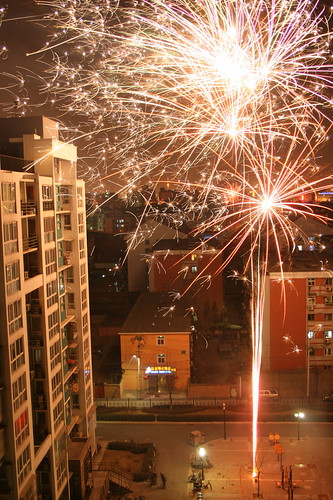
Beijing Chinese New Year Winter Attractions
Fireworks
Each year, Beijing’s skyline erupts in a colorful array of fireworks for nights on end, while daytime hours are filled with noisy fireworks being fired all across the city by residents. The resulting cacophony is deafening and the city literally reverberates for days on end.
The most popular venues for setting off fireworks – and watching the pandemonium that ensues – are around the Drum and Bell Towers in the Houhai Lake district. During the day, this Beijing neighborhood is a perfect place for visitors who want to learn about traditional hutong lifestyles.

Nightlife
Houhai Lake District
If it’s Chinese culture that you’re looking for, start your night off with a rickshaw tour of Houhai Bar Street and its surrounding area. There are an ample number of bars and boutiques situated alongside a picturesque manmade lake; the area is dotted with gardens, ponds, traditional Chinese courtyards and ancient temples.
After you’re finished exploring, warm up with a hot beverage or a nightcap at the nearby Drum & Bell Bar. Overlooking the courtyard between the Drum Tower and Bell Tower, this rooftop bar provides a great view of the lake. In recent years the Drum & Bell Bar have provided a great place to view the fireworks on Chinese New Year’s Eve.
Another local favorite, the East Shore Jazz Café, comes highly recommended as the most authentic jazz in town. The café’s rooftop terrace offers views overlooking Houhai Lake.
Sanlitun Bar Street
Sanlitun Bar Street boasts some of the best nightlife activities in Beijing. Known as THE entertainment district of Beijing, Sanlitun has a wide variety of venues, including nightclubs, sports bars, pubs, coffee houses, and cafes.
As one of the most popular nightclubs in Beijing, Mix Club is the perfect place to dance the night away. The ultra modern 2-story nightclub regularly features international DJs who spin the latest music in a trendy setting that resembles some of the hottest clubs in LA.
The Bird’s Nest
Home to the 2008 Beijing Olympics, the National Stadium, also known as the Bird’s Nest, hosts several celebrations in honor of Chinese New Year. During the Spring Festival, visitors can enjoy an artificial Winter Wonderland that includes skating rinks and mini ski slopes.
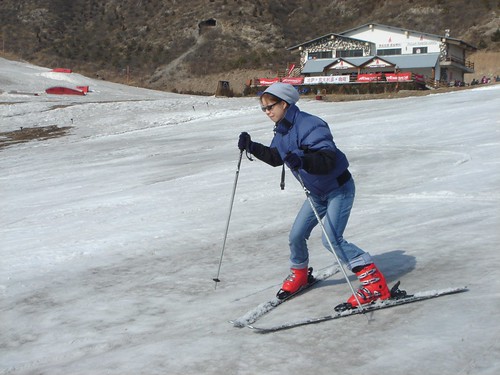
Skiing and Snowboarding
If you tired of sleepless nights in a city that sounds like it’s under siege, try hitting the slopes for a day or two.
Just 30 minutes outside of Beijing, Nanshan Ski Village has one of the best snowboarding parks in the country with five kickers jumps, a mini half-pipe, and over 12 boxes and rails. This winter wonderland also boasts some of the best man-made snow in the world. Experience it for yourself on any of Nanshan’s 12 ski trails, or try your hand at tobogganing or snowmobiling.
Less than a 4-hour drive from Beijing, Wanlong Ski Resort boasts a snowboarding park and 22 ski trails of man-made snow. As China’s largest ski mountain, Wanlong sees over 1000 skiers every weekend.
Celebrate Chinese New Year in a Traditional Village
This tour, hosted by the China Culture Center, takes visitors into the suburbs of Beijing to experience Chinese New Year in a traditional village, where lively street entertainers, folk dancers, puppet shows, sword swallowers, story tellers and magicians spin their magic and showcase their mesmerizing skills. Visit a traditional Chinese home and learn how fire is used to cook and heat the bed. Guests learn how to make dumplings and steam buns. The tour even includes a visit to local artisan who makes life-size paper replicas of horses and carts for Chinese funerals!
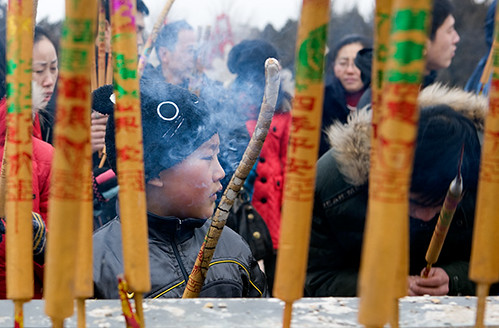
Experience Beijing’s Temple Fairs
Chinese New Year in Beijing is a noisy, colorful and busy occasion. If you’ve never experienced the temple fairs of Beijing, then this should be at the top of your travel itinerary during Chinese New Year.
The first temple fairs in Beijing date back to around 1000 AD. Vendors would often set up shop outside of the temples where pilgrims came to pay tribute to the gods during traditional festival periods such as Chinese New Year.
Today, Beijing’s temple fairs attract thousands of visitors from all over the world. Each year, organizers invite hundreds of performers and artisans from all over China to participate in the Chinese New Year temple fairs that are held near the temples and parks of Beijing.
These lively carnivals offer an opportunity to appreciate traditional artwork and local delicacies, spectacular variety shows from rural areas of China, dragon and lion dances, boys and girls on stilts, life-size puppets, waist drum dancing, lotus blossom fairy dances, Peking opera, acrobatics, and tea culture displays. If all that entertainment makes you hungry, you’re in the right place. You’ll find plenty of snacks and Chinese delicacies to sink your teeth into.
Temple Fair Tour
The China Culture Center offers a temple fair tour in Beijing each Chinese New Year. Visitors learn about the history of Beijing temple fairs and then they are taken to two or three temple fairs where they will get a chance to sample local snacks, purchase traditional handicrafts and view various folk performances and traditional handicrafts.
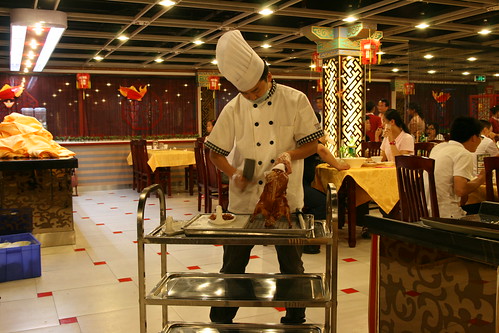
Eat
Chinese New Year celebrations generally begin with a family feast at home, but many families are breaking away from this traditional custom in lieu of eating out. Hu Zhifu, the secretary general of the Beijing Food and Catering Association, states that having Chinese New Year’s Eve dinner at a restaurant first became fashionable in 2003. The number of families that host their New Year’s dinner at restaurants is growing annually.
Popular Beijing Restaurants
Dumplings – Din Tai Fung
When food is renowned as much for its flavor and appearance as it is for being a true work of art, you know you’ve attained perfection in the culinary world. Din Tai Fung got its start in Taiwan in the 1980s, but since then it has expanded to 42 locations in nine countries worldwide. The Beijing restaurant does a brisk business, and many people say that they offer some of the best dumplings in China.
Visitors come for the paper-thin xiao long bao, (steamed dumplings) which are stuffed with vegetables and meat or mashed red beans. Beijing does not have a high concentration of xiao long bao restaurants, and food critics have claimed that the difficulty of finding good xiao long bao in Beijing makes their high prices worth it.
Weighing in at just five grams, the outer-skin of each dumpling is thin as tissue. Each skin is then stuffed with approximately fifteen grams of meat filling. Served with finely sliced pieces of ginger and a soy-based dipping sauce, the end result is sheer art. The tiny bundles bulging with a delightful combination of flavorful soup broth and meat simply burst with flavor.
Mongolian Hot Pot – Donglaishun
After a evening out in the cold Beijing winter air, warm up with a hearty meal of Mongolian Hot Pot at Beijing’s most popular hot pot restaurant, Donglaishun. This northern style hot pot restaurant has been serving Chinese Muslim fare since 1903, and the restaurant is thought to have some of the best shuanyangrou, (instant-boiled mutton) in town. An integral part of northern Chinese cuisine, hot pot is traditionally served in a copper potfilled with soup broth. Meat, frozen bean curd, vegetables, and noodles are added to fill the broth out. Once cooked, a final dip into a sesame butter sauce gives the meal an extra burst of flavor. As Beijing’s most famous hotpot restaurant, Donglaishun may be a little pricey, but its 40 locations throughout the city attest to its popularity.
Peking Duck – Quanjude
No visit to Beijing is complete without dining on glazed and roasted Peking duck. Crispy skin and tender, juicy duck meat is wrapped in paper-thin pancakes and topped with a thick, sweet hoisin sauce, scallions, and radishes.
Locals may argue vehemently on their picks for the best duck in town, but there’s no denying the popularity of Quanjude Roast Duck Restaurant, a seven-story building at #32 Qianmen Dajie. The unique presentation of the food and the traditional interior design at Quanjude has been attracting roast duck lovers for more 146 years.
Shop
Shopping in Beijing is a veritable paradise for bargain hunters. Add Spring Festival fever into the mix and you’ll find yourself looking for deals of the century. Many shops and vendors hold sales to celebrate the New Year, so shop to your heart’s content and don’t forget to bargain!
Hong Qiao Market
One of the best places in China to buy pearls, coral, turquoise and other semi-precious stones lays a short distance from the Temple of Heaven’s main east gate. Prices at Hong Qiao Market are very reasonable owing to a number of vendors selling the same goods, so smile, have fun and bargain hard for your Chinese souvenirs.
GuWanCheng (Curio City)
This four-storey building on the 3rd Ring Road behind Pan Jia Yuan harbors treasures waiting to be discovered. The store offers upscale Chinese antiques with prices to match. The management makes every effort to avoid selling fakes and low quality goods, but please remember the rule that applies to all antique shopping in China: Let the buyer beware.
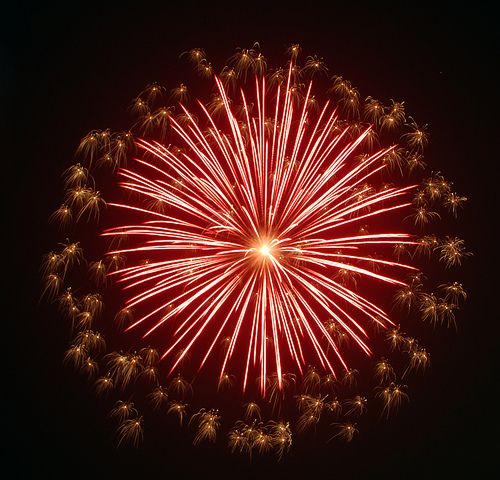
A Note About Travel During Chinese New Year
Mainland China sees more interurban trips during the Spring Festival travel season than the total population of China (1.3 billion as of mid-2008). Masses of people begin rushing home in time to have a reunion dinner with their loved ones on Chinese New Year’s Eve, and all modes of public transportation are thrown into chaos every year. It is almost impossible to book any kind of travel tickets during Chinese New Year, and if you do manage to lay your hands on a ticket, beware that it might be a fake and don’t be surprised to learn that you are paying double the price for a ticket that allows standing room only.
The best advice we can give you about travel in China during Chinese New Year is to plan ahead and don’t try to travel by rail outside of Beijing. On a positive note, since most people stay at home with their families during Chinese New Year, you will be able to take advantage of fewer crowds at some of Beijing’s tourist attractions. Just remember to call ahead to make sure that they’re actually open! Furthermore, if you can beat the crowds, it is a great time to observe local Chinese New Year customs and traditions.
Twelve Tips for Enjoying Chinese New Year in Beijing
- Book your hotel well in advance of Chinese New Year.
- Avoid traveling by rail during Spring Festival.
- Find out where the local performances are being held before you set out on your journey.
- Bring warm clothing. The weather is bitterly cold in Northern China.
- Call ahead if you’re planning on visiting any major tourist attractions since many places close down for a few days during Chinese New Year.
- Catch a lion or dragon dance at one of Beijing’s many temple fairs.
- Firework displays are de rigueur in China during Chinese New Year. Go somewhere special to enjoy the show!
- Buy some chunlian. These temporary decorations are embossed with happy and hopeful messages for the coming year.
- Buy a Chinese-style coat, or purchase some rabbit-head hats and shoes for the kids to usher in the Year of the Rabbit.
- Visit a temple on Chinese New Year’s Eve to pray for a prosperous New Year. Don’t forget to light some incense to send your prayers to the skies.
- Travel a few days before Chinese New Year to avoid getting stuck among the crushing millions of people who are traveling home to be with their loved ones.
- Since many popular Beijing restaurants are booked months in advance, many restaurants recommend that customers book a lunchtime meal instead.
Article Resources
NIGHTLIFE – As of this writing, these establishments have not confirmed if they will be open during Chinese New Year’s Eve 2012.
- Drum & Bell Bar: #41 Zhonglouwan Hutong – Telephone: 86-010-8403-3600
- East Shore Live Jazz Café: Houhai, 2nd Floor, 2 Shichahai Nanya –Telephone: 86-010-8403-2131
- MIX Club: Workers Stadium, North Gate, Chaoyang District, Beijing Open 8pm to 6am. www.mixclub.sohu.com – Telephone 86-010-6530-2889
ACTIVITIES
- The Bird’s Nest National Stadium: Olympic Green Village, Chaoyang District
- Nanshan Ski Village: Shengshuitou Village, Henanzhai Town – Telephone: 010-8909-1909 www.nanshanski.com
- Wanlong Ski Resort: Honghualiang, Chongli Xian, Hebei Province 031-3478 5111 – www.wiski.com
RESTAURANTS
- Din Tai Fung Beijing: #24, Xinyuan Xili Zhongjie www.dintaifung.com.cn Telephone +86-010-6462-4502
- Donglaishun Dongcheng Branch: Xin Dongan Plaza, 5F, Wangfujing, Dongcheng – Telephone: 010-6528-0932
- Quanjude Jinsong Branch: #826, Jingsong Eight District, Guangming Bridge – Telephone: 010-67711211
- Quanjude Hepingmen Branch: #14, Qianmen West Street – Telephone: 010-63023062
- Quanjude Qianmen Branch: # 32, Qianmen Dajie – Telephone: 010-6701-1379
CHINA CULTURE CENTER
Kent Centre A 101, Anjialou, No.29, Liangmaqiao Road, Chaoyang District – info@chinaculturecenter.org – www.chinaculturecenter.org
Telephone +86–010-6432-9341
Fax: +86–010-6432-0145
Celebrate Chinese New Year in a Village
February 5, 2011. RMB 350 per person. The bus leaves the China Culture Center at 9am and returns at 4pm. Call 86-10-6432-9431 to reserve your spot. Book early because tickets sell out fast!
February 4, 2011. Tour price (RMB 200 per person) includes admission tickets, lunch, and transportation. The bus leaves from the China Culture Center at 9:30am and returns at 4pm. Call 86-10-6432-9431 to reserve your spot.

Canadian expat Carrie Kellenberger has kept a home base with her husband in Asia since 2003. A prolific traveler, Carrie has funded her travels primarily as a writer, editor, travel blogger and photographer, but she has also worked as an educator, voice over artist, model and nightclub singer. She draws upon her 15+ years of travel experience to write about travel-related issues and the countries she has visited on her award-winning web site, My Several Worlds.
Her photography and travel articles have appeared in both print and online publications around the world, including Travel and Leisure Asia, Unearthing Asia and Hip Compass Escapes.








